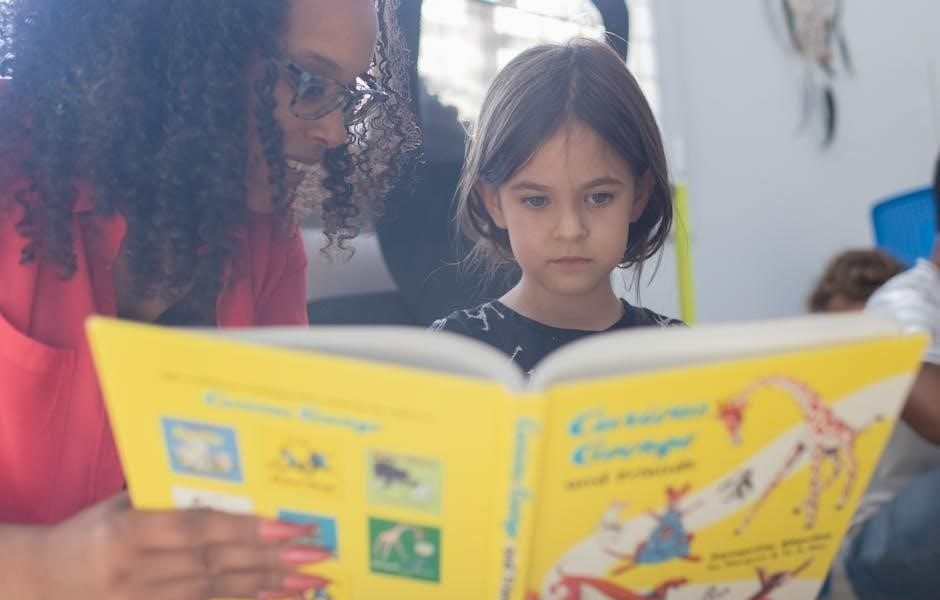
reading comprehension year 7 pdf
Reading comprehension is a vital skill for Year 7 students, enabling them to understand, interpret, and analyze texts effectively․ It forms the foundation for academic success․
1․1 Definition and Importance of Reading Comprehension
Reading comprehension is the ability to understand, interpret, and analyze written texts effectively․ It involves critical thinking to extract meaningful information and make connections․ This skill is essential for academic success, enabling students to engage with various subjects confidently․ Good comprehension enhances communication, problem-solving, and analytical abilities․ It also fosters a deeper understanding of different perspectives and ideas․ For Year 7 students, mastering reading comprehension lays a strong foundation for future learning, helping them to make informed decisions and broaden their knowledge across diverse areas․ Ultimately, it is a cornerstone of lifelong learning and personal growth․
1․2 Key Skills Required for Effective Reading Comprehension
Effective reading comprehension requires a combination of essential skills, including vocabulary understanding, fluency, and the ability to identify main ideas and supporting details․ Students must also develop inference skills to interpret information not explicitly stated․ Critical thinking is crucial for analyzing and evaluating texts, while making connections (text-to-self, text-to-text, text-to-world) enhances deeper understanding․ Additionally, focus and concentration are necessary to engage fully with the material․ These skills collectively enable students to comprehend, interpret, and apply the information they read, making reading comprehension a powerful tool for academic and personal growth․

Strategies to Improve Reading Comprehension
Improving reading comprehension involves key strategies like summarizing, asking questions, making connections, and engaging in active reading to enhance understanding and retention of texts effectively․
2․1 Summarizing and Identifying Main Ideas
Summarizing and identifying main ideas are crucial strategies for improving reading comprehension․ Summarizing involves condensing texts into key points, helping students grasp the essence quickly․ Identifying main ideas requires focusing on the central theme or message the author conveys․ These skills enable students to distinguish between important and secondary details, enhancing their ability to understand and retain information․ By practicing these techniques, Year 7 students can better analyze complex texts, prepare for discussions, and perform well in assessments․ Regular practice with guided exercises and sample texts can strengthen these skills, making reading more effective and enjoyable․
2․2 Asking Questions Before, During, and After Reading

Asking questions at different stages of reading is a powerful strategy to enhance comprehension․ Before reading, students can ask questions to set purposes, such as identifying the main topic or author’s intent․ During reading, questions help clarify uncertainties and deepen understanding of specific details․ After reading, students can reflect on the text by asking broader questions about themes or implications․ This active engagement fosters critical thinking and ensures students remain focused and invested in the material․ Regularly practicing this technique helps Year 7 students develop a habit of inquiry, improving their ability to process and retain information effectively․
2․3 Making Connections (Text-to-Self, Text-to-Text, Text-to-World)
Making connections while reading helps students engage deeply with the text․ Text-to-self connections involve linking the material to personal experiences or feelings, fostering a relatable understanding․ Text-to-text connections require students to relate the current text to other texts they’ve read, identifying similarities or differences․ Text-to-world connections encourage students to think about how the text relates to broader societal issues or global events․ By establishing these connections, Year 7 students can develop a richer comprehension of the material, as well as improve their critical thinking and analytical skills․ This strategy also enhances retention and makes reading more meaningful and interactive․

Question Types in Reading Comprehension
Reading comprehension involves answering literal, inferential, and evaluative questions․ These question types assess understanding, ability to make inferences, and capacity to analyze and judge the text content․
3․1 Literal Questions (Understanding the Text Directly)
Literal questions require students to extract information directly from the text without interpretation․ They focus on specific details, such as names, dates, or events explicitly mentioned․ These questions assess a student’s ability to identify and recall facts accurately․ For example, “What is the main character’s name?” or “Where did the story take place?” Literal questions are foundational, as they ensure students can comprehend the text at its most basic level․ They often appear in reading assessments and are essential for building confidence in reading comprehension skills․ Regular practice with literal questions helps students develop accuracy and attention to detail in their reading․
3․2 Inferential Questions (Making Inferences Based on the Text)
Inferential questions require students to go beyond the literal meaning of the text․ They involve making logical conclusions or judgments based on clues or evidence within the text․ For example, “Why do you think the character felt sad?” or “What might happen next in the story?” These questions enhance critical thinking and analytical skills․ They challenge students to connect ideas and draw conclusions not explicitly stated․ Regular practice with inferential questions helps students develop deeper understanding and appreciation of texts․ Such questions are essential for preparing students to tackle more complex comprehension tasks in higher grades․
3․3 Evaluative Questions (Analyzing and Judging the Text)
Evaluative questions require students to analyze and judge the content of a text․ They involve expressing opinions or making judgments based on evidence․ For example, “Do you agree with the author’s opinion?” or “Is the main character’s decision justifiable?” These questions encourage critical thinking and the ability to support arguments with textual evidence․ Evaluative questions help students develop a deeper understanding of themes, characters, and author intent․ They also prepare students for more advanced literary analysis in later years․ Regular practice with evaluative questions enhances students’ ability to engage with texts on a higher cognitive level․
Activities to Enhance Reading Comprehension
Engaging activities like group discussions, role-playing, and using visual aids help Year 7 students improve comprehension․ These methods make learning interactive and effective․
4․1 Group Discussions and Role-Playing
Group discussions and role-playing are effective ways to enhance reading comprehension for Year 7 students․ These activities encourage active participation, fostering deeper understanding and critical thinking․ By engaging in literature circles or debate sessions, students learn to express their interpretations and listen to others’ perspectives, broadening their insights․ Role-playing activities, such as acting out scenes from a text, help students connect emotionally with the material, making it more relatable․ These collaborative methods also build confidence and communication skills, which are essential for academic success․ Regular participation in such activities can significantly improve students’ ability to analyze and interpret complex texts effectively․
4․2 Using Visual Aids and Graphic Organizers
Visual aids and graphic organizers are powerful tools that enhance reading comprehension by helping students visually organize and process information․ Tools like diagrams, charts, and mind maps enable students to break down complex texts into manageable parts․ Graphic organizers, such as Venn diagrams or concept maps, assist in identifying relationships between ideas and themes․ These resources are particularly effective for visual learners, as they provide a structured way to analyze and retain information․ Teachers often incorporate these aids into lessons to make learning interactive and engaging, ensuring students can better grasp and interpret the material they are reading․
4․3 Practicing with Sample Papers and Worksheets
Practicing with sample papers and worksheets is an effective way to improve reading comprehension skills․ These resources provide students with hands-on experience, familiarizing them with question formats and text types they may encounter in exams․ Many worksheets and sample papers are available online or in PDF formats, covering a range of topics and difficulty levels․ Regular practice helps students build confidence, improve accuracy, and develop time management skills․ Answer keys are often included, allowing students to self-assess and identify areas for improvement․ Consistent practice with these materials enhances understanding and prepares students for formal assessments, making learning both engaging and productive․
Resources for Year 7 Reading Comprehension
Accessing quality resources like worksheets, online tools, and engaging books is essential for improving reading skills․ These materials cater to varying learning styles and difficulty levels․
5․1 Recommended Worksheets and PDF Materials
Year 7 students can benefit from a variety of worksheets and PDF materials designed to enhance reading comprehension․ These resources often include sample papers, answer keys, and exercises tailored to specific skill levels․ Many worksheets focus on identifying main ideas, making inferences, and analyzing texts․ They also provide structured activities to practice different question types, such as literal, inferential, and evaluative questions․ Additionally, PDF materials may include graphic organizers to help visualize concepts and connections․ These tools are widely available online and can be adapted to suit individual learning needs, offering a comprehensive way to improve reading comprehension skills effectively․
5․2 Online Tools and Interactive Learning Platforms
Interactive online tools and learning platforms offer engaging ways for Year 7 students to improve reading comprehension․ Platforms like Kahoot and Quizlet provide gamified exercises and quizzes to practice skills․ Tools such as ReadTheory and Reading A-Z feature leveled texts and instant feedback, helping students track progress․ Many platforms incorporate multimedia elements, such as audio and visual aids, to enhance understanding․ These resources are accessible anytime, making them ideal for supplementary practice․ They often include progress tracking, allowing students and teachers to identify areas for improvement․ Utilizing these tools can make learning dynamic and effective, catering to diverse learning styles and preferences․
5․3 Books and Articles Suitable for Year 7 Students

Engaging books and articles tailored to Year 7 students play a crucial role in enhancing reading comprehension․ Titles like “The Diary of a Young Girl” by Anne Frank and “The Giver” by Lois Lowry offer relatable themes and complex narratives․ Articles from educational platforms such as ReadWorks and Newsela provide leveled texts that align with curriculum standards, ensuring accessibility for all learners․ These resources often include discussion prompts and comprehension exercises, helping students deepen their understanding․ Additionally, books like “Wonder” by R․J․ Palacio promote empathy and critical thinking, making them ideal for classroom discussions and independent reading․ Such materials foster a lifelong love for reading and learning․
Consistent practice and engagement with various resources are key to improving reading comprehension․ Encourage students to regularly explore books, articles, and online tools to become confident readers․
6․1 Recap of Key Strategies and Resources
To enhance reading comprehension, Year 7 students should practice summarizing, asking questions, and making connections․ Utilize graphic organizers, group discussions, and sample papers for effective learning․ Incorporate recommended books and online tools to diversify study materials․ Regular practice and engagement with these strategies will build confidence and improve understanding, ensuring a strong foundation for future academic success․
6․2 Encouragement to Practice Regularly
Consistent practice is essential for improving reading comprehension․ Encourage students to dedicate time daily to reading and applying strategies like summarizing and questioning․ Celebrate progress, no matter how small, to build confidence․ Make practice engaging with varied texts and activities․ Regular engagement fosters a deeper understanding and enjoyment of reading, preparing students for long-term academic success․ Motivate them to view challenges as opportunities to grow, ensuring they stay committed to developing this crucial skill․
Related Posts

indesit fast and clean dishwasher manual
Discover how to keep your dishes sparkling with our easy-to-follow Indesit dishwasher manual from the UK. Make cleaning effortlessly perfect!

x24 st andrews to glasgow timetable pdf
Get the latest 24 St Andrews to Glasgow timetable PDF for your journey. Plan your trip effortlessly with our up-to-date schedules!

application form for volunteer work
Find volunteer work in the UK. Apply for volunteer opportunities and make a difference with DKV Photos. Join today!